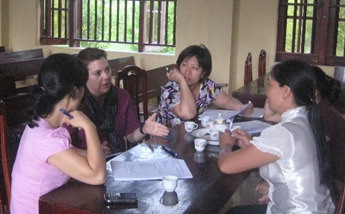
Dr. Pamela McElwee (second from left), Dr. Le Thi Van Hue (center) and colleagues discuss plans for their joint project (photo courtesy of Dr. Le Thi Van Hue). |
Forecasted global climate changes have the potential to exacerbate existing social vulnerabilities, especially in poorer developing countries, and communities’ and individuals’ ability to cope with these future changes are often conditioned on their ability to access and mobilize natural resources. At the same time, new global policies would pay countries for “avoided deforestation” through forest conservation efforts known as Reduced Emissions from Degradation and Deforestation (REDD+) to sequester carbon and contribute to climate change mitigation.
However, as access and use rights to forests change under REDD implementation, this may render some households and communities
more vulnerable to the effects of climate change in the long term if REDD policies reduce their adaptive capacity by restricting access to natural resources. Thus, an understanding of the potential outcomes of carbon-credit policies on land use decision-making is necessary before such large-scale global programs get more fully underway.
This study built upon an early REDD development site in Vietnam and explored several questions regarding this new policy. The PEER-supported project, involving three Vietnamese institutions, expanded an existing project to new field sites and additional data collection on environmental conditions. To promote capacity building with local policymakers and NGOs on key REDD issues, short training courses and national workshops were organized.
Researchers collected basic information and undertook preliminary field research on several field sites, including Kien Giang, Kon Tum, Dien Bien and Hoa Bin. PEER team members met with different groups of stakeholders to inform them about the project activities and explore opportunities for cooperation in the field of climate change and local livelihood research work. Researchers also collected data for land use maps for research sites, covering 1990 through 2010, relying on satellite and remotely sensed data. Early in the project, the research team took part in a training workshop on research methodologies to help them better understand statistical analysis of survey data and index development techniques.
Dr. Hue and her co-PIs and colleagues hosted a workshop on the development of a Provincial REDD+ Environmental and Social Index (RESI), providing them an opportunity to consult experts, management authorities/agencies, research institutes and NGOs on their opinions of how an index for social and environmental impacts of REDD and what indicators and criteria would be suitable for the provincial level. Nineteen key indicators were identified by the workshop participant and were included in the final field research surveys.
The PEER team organized a two-day training course for local officials at the commune level and rangers of the Bi Doup Nui Ba National Park and Lac Duong district on “Local Livelihoods and Forest Protection in the Context of Climate Change,” and an extended training course “Social and Environmental Safeguard: Developing Tools for Monitoring PES/REDD Project for Success.” Participants in the latter spent six days learning to design surveys for their research, spent six days in the field in Hoa Binh and then had three months to carry out their own research and write reports under the supervision of CRES research team members.
The researchers carried out field surveys, focus group discussions, 100 household interviews and key informant interviews. A final workshop introduced the RESI framework, discussed the outcomes of the pilot assessment in Son La, Dien Bien, Kon Tum and Kien Giang provinces and the ability to apply the index in the process of developing and monitoring the Provincial REDD+ Action Plan.
PublicationsP. McElwee with Hue Le, Tuyen Nghiem, Nghi Tran, Huong Vu, and Dung Nguyen. 2016. Doing REDD+ Work in Vietnam: Will the New Carbon Focus Bring Equity to Forest
Management? Chapter in The Carbon Fix: Global Equity and The New Environmental Regime, S. Fiske and S. Paladino, editors.
https://doi.org/10.4324/9781315474014 Nghiem Phuong Tuyen, Pamela McElwee, Le Hue, and Vu Huong. 2016. Downscaling REDD Policies in Developing Countries: Assessing the Impacts of Carbon Payments on Household Decision Making and Vulnerability to Climate Change in Vietnam. Research Report rr20160319 from the Economy and Environment Program for Southeast Asia (EEPSEA).
Nguyen Hai Van and Nguyen Viet Dung, authors, with English translation, proofreading, and editing by Hong Anh Nguyen and Nick Thorpe. 2015. Provincial REDD+ Environmental and Social Index: Implementation Guidelines.
Nguyen Hai Van and Nguyen Viet Dung, authors, with English translation, proofreading, and editing by Hong Anh Nguyen and Nick Thorpe. 2015. Environmental and Social Index for Provincial REDD+ Planning and Implementation in Vietnam.
P. McElwee, N.P. Tuyen, H. Le, H. Vu, and N. Tran. 2014. Payments for Environmental Services and Contested Neoliberalisation in Developing Countries: A Case Study from Vietnam.
Rural Studies 36: 423-440.
http://dx.doi.org/10.1016/j.jrurstud.2014.08.003A RESI website has been launched at
www.nature.org.vn/resi/vi/, including all RESI documents, reports, the RESI Manual, indicators, criteria, and detailed provincial data from Kontum, Dien Bien, Son La, and Kien Giang provinces.




